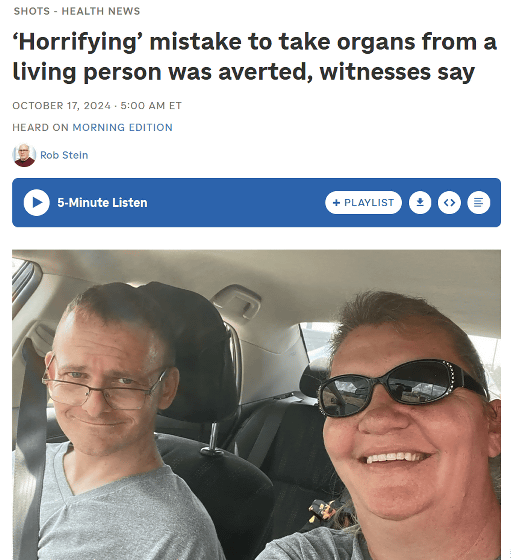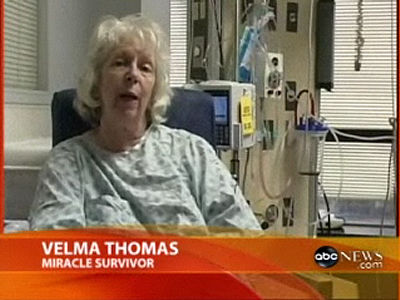A horrifying case is reported in which a man declared brain dead was found to be still alive just before his organs were harvested.

A horrifying case has been reported in which a Kentucky man was declared brain dead only to be found alive just before his organs were to be harvested for transplant. The case has not only shocked the medical professionals involved, but also raised questions about the protocols used by US hospitals and organ donation networks to certify brain death.
A man declared dead almost had surgery to donate his organs, but he was still alive : Shots - Health News : NPR

Man Declared Brain Dead Wakes Up as Organs About to Be Removed : ScienceAlert
https://www.sciencealert.com/man-declared-brain-dead-wakes-up-as-organs-about-to-be-removed
One day in October 2021, an organ transplant was scheduled at Baptist Health Hospital in Richmond, Kentucky. However, when the nurses carried the brain-dead donor into the operating room, the donor appeared to be alive.
'He was moving around, moving around, thrashing around on the bed,' Natasha Miller, an organ preservationist who was in the operating room at the time, told public media outlet NPR. 'And we went in and we could see he had tears in his eyes. He was clearly crying.'
Naturally, the fact that the donor was still alive upset everyone in the operating room, and both doctors refused to proceed with the organ removal. According to Miller, the doctor in charge of the removal said, 'I'm out of here. I don't want anything to do with it.'
However, when Miller's employer, the Kentucky Organ Donor Association (KODA) case coordinator, called her supervisor, the supervisor told her to 'find another doctor,' 'We were going to do this case. We have to find someone to replace us,' and instructed her to continue with the organ harvesting. Miller told NPR, 'She said, 'There's no one to replace me.' She was crying because her supervisor yelled at her.'

The organ harvest in October 2021 has been canceled, and some KODA employees have resigned in response to the incident. One of those who resigned, former organ preservation activist Nicoletta Martin, said, 'I have dedicated my life to organ donation and transplantation. Now I am horrified that cases like this are allowed to happen and that more is not being done to protect donors.'
Martin wasn't in the operating room at the time, but there was a good chance he would be assigned to the procedure, and when he reviewed the case notes from that day, he discovered that the donor's heart had already shown signs of life when doctors examined it before the organ was harvested.
'That morning, the donor was awake during a cardiac catheterization procedure. He was thrashing around on the operating table,' Martin said. Cardiac catheterization is done on potential donors to determine whether their hearts are suitable for transplant into a new patient. Doctors sedated the awake donor and continued the procedure.
The whole situation came to light when Martin sent a letter to the U.S. House of Representatives Committee on Energy and Commerce in September 2024. Martin told NPR, 'This is everyone's worst nightmare, right? Being alive during surgery and knowing that someone is going to cut you open and take parts of you out. That's terrifying.'

The donor, whose organs were nearly removed while he was still alive, is known to be 36-year-old Anthony Thomas TJ Huber II of Richmond, who was taken to the hospital after suffering a drug overdose and was declared brain dead, according to his sister, Donna Lawler.
Lawler, who was at the hospital during the organ removal surgery, testified that he was concerned when Huber's eyes appeared to open and look around as he was taken from the intensive care unit to the operating room. 'It was like he was letting us know, 'I'm still here,'' Lawler told NPR. But medical staff told Lawler and other family members that Huber's movements were just a normal reflex and tried to remove his organs.
Fortunately, Hoover survived, but he continues to have problems with speech, memory and behavior, so Lawler is caring for him. 'I feel betrayed because my brother woke up after being told by medical personnel that he was brain dead. They're trying to play God. They're choosing people to sacrifice to save someone else. And it makes you lose a little bit of faith in humanity,' Lawler said.
In a statement to NPR, the Kentucky Attorney General's Office said investigators are reviewing the allegations. The federal Health Resources and Services Administration (HRSA), which helps oversee organ procurement, also said it is looking into the allegations. Baptist Health, where the incidents allegedly occurred, said in a statement, 'Patient safety is always our top priority. We work closely with patients and their families to ensure that patients' wishes regarding organ donation are met.'
KODA, however, denied any pressure to continue organ harvesting in a statement to NPR, saying, 'This incident has not been accurately described. No one at KODA was ever pressured to harvest organs from living patients. KODA does not collect organs from living patients.'

Huber's case is not the only reported case of a donor surviving just before organ harvesting. At the hearing following Martin's allegations, Dr. Robert Cannon, a transplant surgeon at the University of Alabama at Birmingham, reported seeing similar cases at a hospital outside Alabama.
'We were actually in the middle of opening the donor up and preparing to harvest the organs, and at that point the ventilator was turned on, and the anesthesiologist at the head of the operating table said, 'Hey, this patient may have just breathed.' Breathing means he wasn't brain dead,' Cannon said. Despite that, the organ procurement organization (OPO) staff demanded that the surgery continue, and Cannon was shocked at how little they knew about brain death.
'This is a horrific story that I think needs to be followed up carefully,' said Dr. Robert Turugu, a professor of medical ethics, anesthesiology and pediatrics at Harvard Medical School. But he said cases of donors surviving right before organ removal are rare. 'I believe this is a one-off event, and we can get to the bottom of it and make sure it never happens again,' Turugu said.
◆ Forum is currently open
A forum related to this article has been set up on the official GIGAZINE Discord server . Anyone can post freely, so please feel free to comment! If you do not have a Discord account, please refer to the account creation procedure explanation article to create an account!
• Discord | 'Have you expressed your intention to donate your organs in the event of brain death?' | GIGAZINE
https://discord.com/channels/1037961069903216680/1298573306630373448
Related Posts:
in Science, , Posted by log1h_ik







